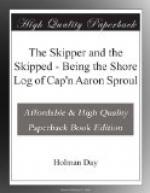The doomed Dobson was swashing toward the roaring shore broadside on. The first ledge would roll her bottom up, beating in her punky breast at the same time. This was the programme the doleful skipper had pictured in his mind. There was no way of winning a chance through the rocks, such as there might have been with steerageway, a tenuous chance, and yet a chance. But the Cap’n decided with apathy and resignation to fate that one man could not raise a sail out of that wreck forward and at the same time heave her up to a course for the sake of that chance.
As to Imogene he had not reckoned.
Perhaps that faithful pachyderm decided to die with her master embraced in her trunk. Perhaps she decided that the quarter-deck was farther above water than the waist.
At any rate, curving back her trunk and “roomping” out the perturbation of her spirit, she reared on her hind-legs, boosted herself upon the roof of the house, and clawed aft. This auto-shifting of cargo lifted the bow of the little schooner. Her jibs, swashing soggily about her bow, were hoisted out of the water, and a gust bellied them. On the pivot of her buried stern the Dobson swung like a top just as twin ledges threatened her broadside, and she danced gayly between them, the wind tugging her along by her far-flung jibs.
In matter of wrecks, it is the outer rocks that smash; it is the teeth of these ledges that tear timbers and macerate men. The straggling remains are found later in the sandy cove.
But with Imogene as unwitting master mariner in the crisis, the schooner dodged the danger of the ledges by the skin of her barnacled bottom, spun frothing up the cove in the yeast of the waves, bumped half a dozen times as though searching suitable spot for self-immolation, and at last, finding a bed of white sand, flattened herself upon it with a racket of demolition—the squall of drawing spikes her death-wail, the boom of water under her bursting deck her grunt of dissolution.
The compelling impulse that drives men to close personal contact in times of danger had assembled all the crew of the schooner upon the poop, the distracted Imogene in the centre. She wore the trappings of servitude—the rude harness in which she had labored to draw up the buckets of dirt on Cod Lead, the straps to which the tackle had been fastened to hoist her on board the Dobson.
When the deck went out from under them, the elephant was the biggest thing left in reach.
And as she went sturdily swimming off, trunk elevated above the surges, the desperate crew of the Dobson grabbed at straps and dangling traces and went, too, towing behind her. Imogene could reach the air with the end of her uplifted trunk. The men submerged at her side gasped and strangled, but clung with the death-grip of drowning men; and when at last she found bottom and dragged herself up the beach with the waves beating at her, she carried them all, salvaged from the sea in a fashion so marvellous that Cap’n Aaron Sproul, first on his legs, had no voice left with which to express his sentiments.




